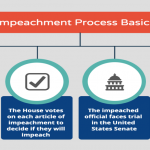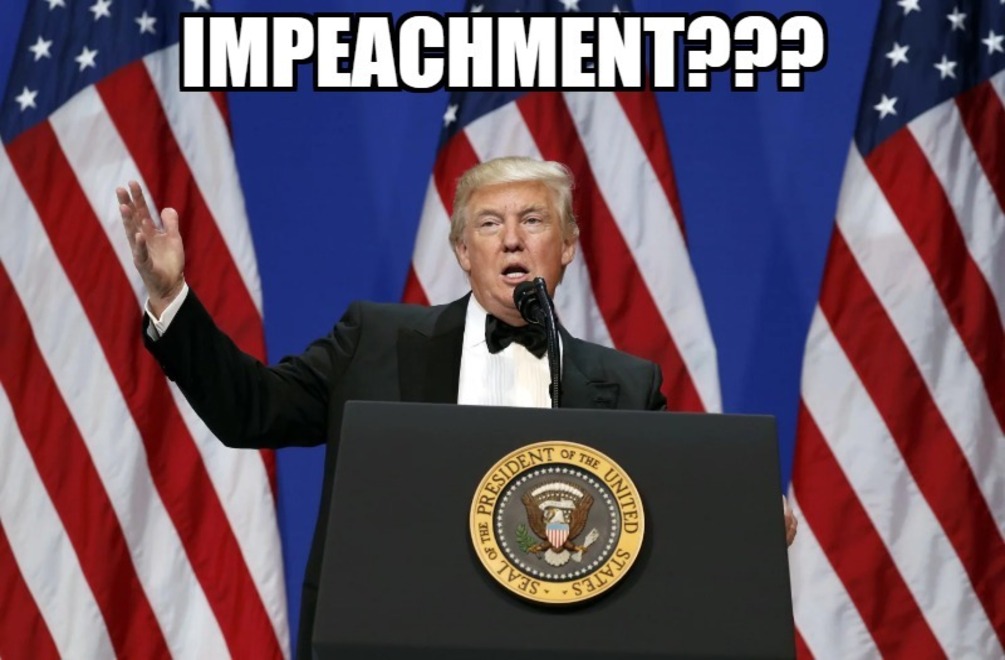
According to a recent Quinnipiac poll, 65% of Democrats think that if Democrats win control of Congress they should impeach President Trump. Liberal billionaire Tom Steyer’s Need to Impeach campaign has collected over 5 million signatures in support of impeachment of President Trump. In May of last year, Democrat Congressman Al Green of Texas went to the House floor and called for the impeachment of President Trump, making him the first elected official to do so. In the midst of all these calls for impeachment are some Democrats losing perspective on what the true purpose of impeachment is?

Billionaire Tom Steyer is spending millions on a campaign to impeach President Trump
Article 2 section 4 of the American Constitution states: The President, Vice President and all civil Officers of the United States, shall be removed from Office on Impeachment for, and Conviction of, Treason, Bribery, or other high Crimes and Misdemeanors. The definition of treason and bribery is clear, the definition of other high crimes and misdemeanors is not.

Democrat Congressman Al Green was the 1st elected official to call for the impeachment of President Trump, since then many Democrats have joined his call
At the Constitutional Convention in 1787, the framers of the constitution added “high crimes and misdemeanors” to treason and bribery as reasons for impeachment. The framers knew the phrase well because the English parliament had used “high crimes and misdemeanors” as one of the grounds to impeach officials of the crown. Officials accused of high crimes and misdemeanors were accused of offenses as varied as misappropriating government funds, appointing unfit subordinates, not prosecuting cases, not spending money allocated by Parliament, promoting themselves ahead of more deserving candidates, threatening a grand jury, disobeying an order from Parliament, arresting a man to keep him from running for Parliament, losing a ship by neglecting to moor it, helping “suppress petitions to the King to call a Parliament,” granting warrants without cause, and bribery. Some of these charges were crimes. Others were not. The one common denominator in all these accusations was that the official had somehow abused the power of his office and was unfit to serve.

Since 1787 impeachment charges have only been brought against 3 presidents:
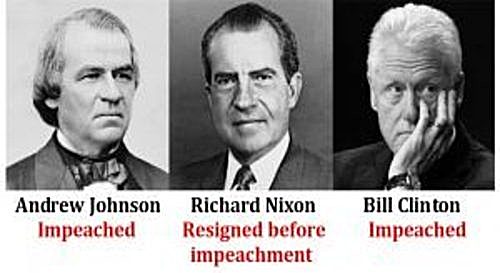
Andrew Johnson– In 1865 Congress passed a Tenure of Office Act, which required Johnson to get permission from Congress before firing any member of the executive branch who had been approved by Congress. Believing the act was unconstitutional Johnson responded by firing the secretary of war, Edwin Stanton. The House then passed 11 articles of impeachment. Eight involved Johnson’s violations of the Tenure of Office Act. One charged him with sending orders through improper channels. Another accused him of conspiring against Congress, citing a statement he made about Congress not representing all the states. The last summarized the other 10 charges and charged him with failing to enforce the Reconstruction Acts. At the end of the Senate trial, only three charges were brought to a vote. Johnson was saved from conviction on each charge by one vote.
Richard Nixon– During the 1972 presidential elections burglars with links to the White House had been caught breaking into Democratic headquarters at the Watergate Hotel in Washington. President Nixon feared an investigation into the break-in would find evidence of political spying and the illegal use of campaign funds on the part of his administration. As a result, he took an active role in obstructing the investigation by ordering the FBI to stop investigating the crime. In 1974, the House Judiciary Committee voted three articles of impeachment. One accused Nixon of obstruction of justice. Another accused him of abuse of power. The third charged him with contempt of Congress for defying the committee’s requests to produce documents. Nixon resigned the presidency before the whole House voted on the articles.
Bill Clinton– In 1998 the House voted 2 articles of impeachment against President Clinton. Both articles were related to an adulteress affair he had with a White House intern. The first article accused the president of committing perjury before a grand jury convened by the independent counsel. The second charged him of obstructing justice to “delay, impede, cover up and conceal the existence” of evidence related to the scandal. During the trial, the Senate failed to convict Clinton on either of the 2 charges.
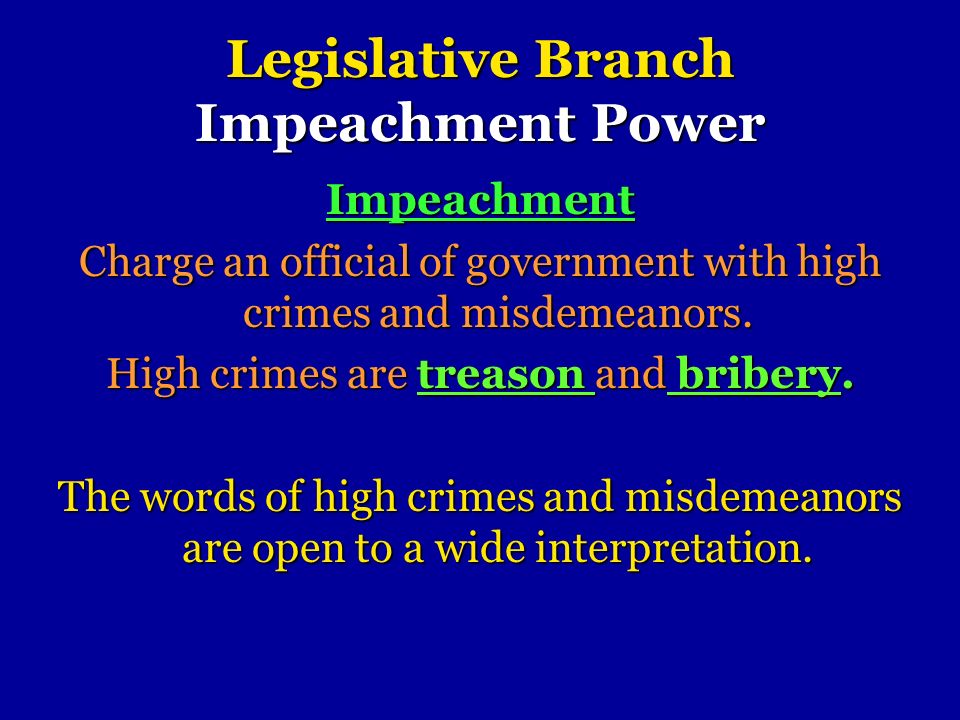
Our founding fathers purposely left the definition of “high crimes and misdemeanors” vague and subject to Congresses interpretation. This was done to provide a mechanism to remove a President thought to be doing immediate harm to the Constitution, the American government, or American society without waiting for the next election.
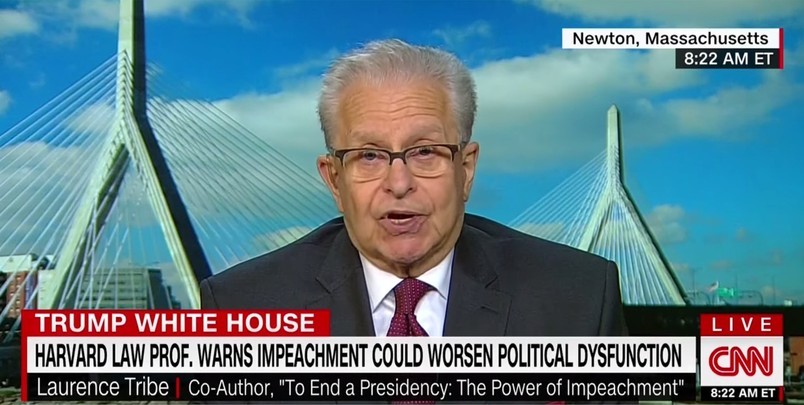
Harvard Law School professor Laurence Tribe warned “If we were to use the impeachment power simply as a substitute for buyer’s remorse, we would really use the impeachment power to undermine, rather than save, our democracy,”
But our founding fathers never intended impeachment to be a citizen or voter recall of the President. It is also clear that the founding fathers did not agree with former President Gerald Ford’s definition of impeachment. In 1970 then-Congressman Gerald Ford said during debate about the possible impeachment of Supreme Court Justice William O. Douglas, “An impeachable offense is whatever a majority of the House of Representatives considers it to be at a given moment in history” As Georgia State University Professor of Law Neil J. Kinkopf points out: If the Constitution means to allow impeachment on any ground whatsoever, then why would the Constitution bother to set forth that impeachment and removal may be based only on conduct that rises to the level of “treason, bribery, or other high crimes and misdemeanors”?
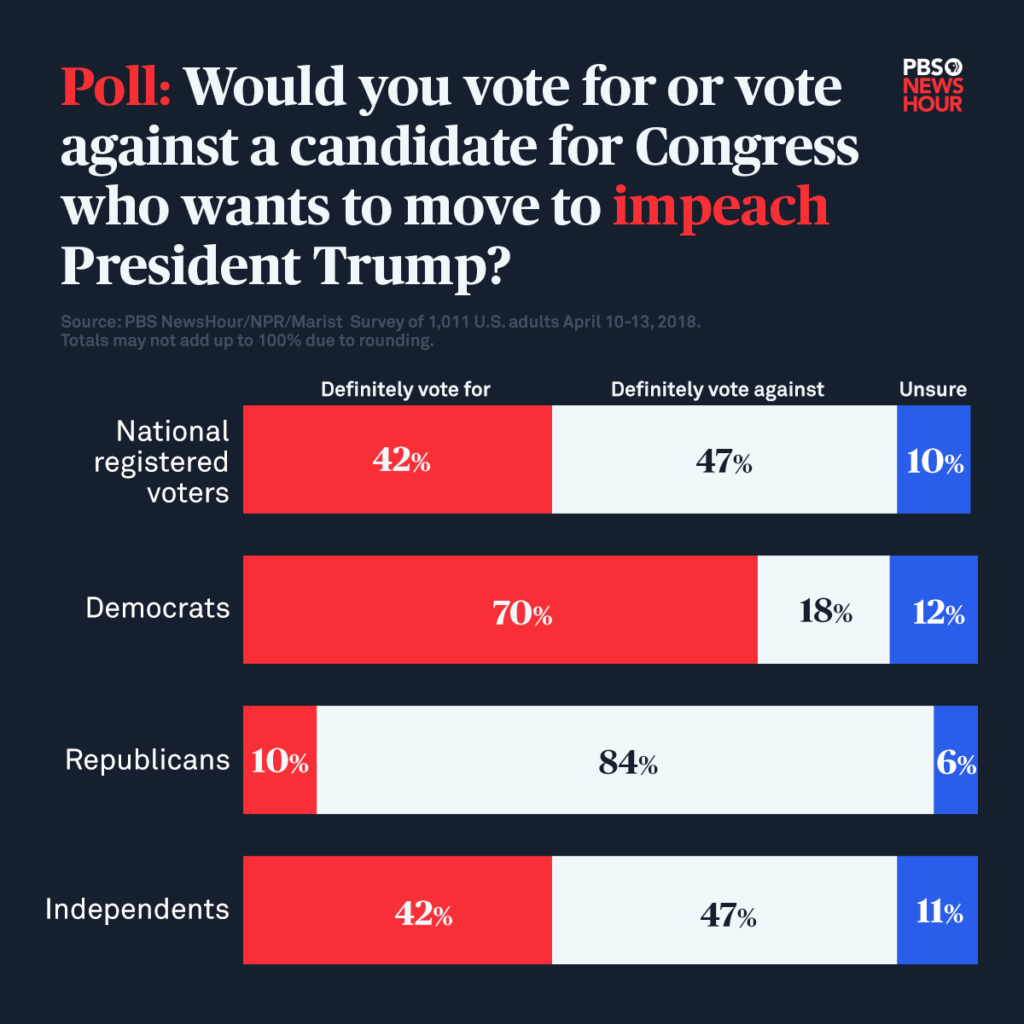
A PBS NewsHour/NPR/Marist Survey of 1,011 U.S. adults taken April 10-13, 2018 shows only Democrats want to make impeachment an election issue
The founding fathers were determined to limit the grounds on which an officer could be impeached in order to safeguard another constitutional principle, the Separation of Powers. They recognized the legal principle that the power to remove is the power to control. If Congress can impeach and remove the President or Supreme Court Justices for any reason at all, then these officers serve at the will of Congress and are subject to its control. For instance, an early draft of the Constitution gave Congress the power to impeach and remove officers for “maladministration.” Founding father James Madison objected to this because the term was so vague that it would allow impeachment for any reason at all. As he put it, “so vague a term will be equivalent to a tenure during the pleasure of the Senate.”
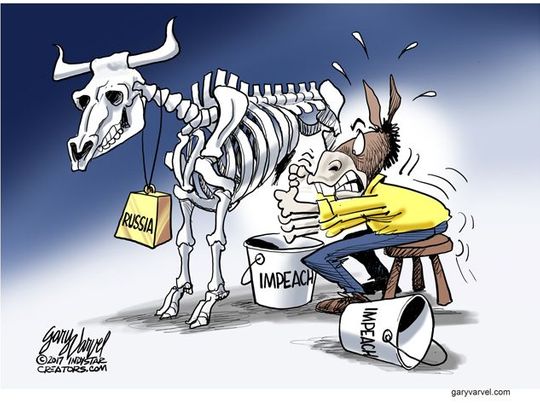
So far no evidence of an impeachable offense against President Trump has been found
Of the 3 past impeachments of our Presidents, only the Nixon impeachment clearly meets the standard set by the founding fathers. This was so obvious to Nixon himself that he resigned office after the House Judiciary Committee voted to impeach him, and before the full House could vote to impeach him. The Johnson and Clinton impeachments appear to be attempted by opposing political opponents to exert unconstitutional power over the nation’s chief executive. Fortunately, the U.S. Senate saw through the bad politics and acquitted both Johnson and Clinton at the end of the Senate trials.
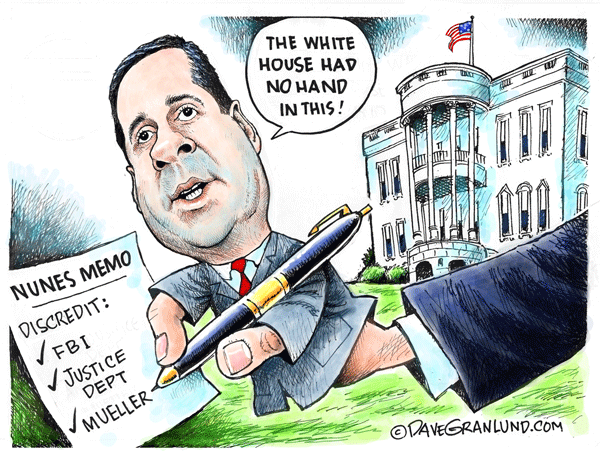
Congressman Devin Nunes Chairman of the House Permanent Select Committee on Intelligence has done everything possible to prevent a thorough investigation of Russian interference in the 2016 election, and he is also is part of smear campaign against Special Counsel Robert Mueller in order to protect President Trump
Democrats must remember that the founding fathers and the Constitution set a HIGH bar for removal of a President from office. To overturn a democratically elected President is, in essence, defying the will of the American people, a will that was expressed by the American people through their votes. Elections do have consequences, consequences that must be honored unless they do harm to American democracy through the subversion of American law.
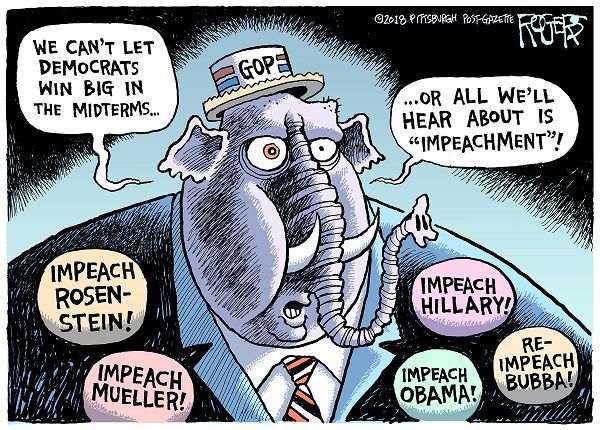
Republicans have an impeachment double standard, they support impeachment for everyone else besides themselves and President Trump
A President saying things that offend us, even racist things doesn’t meet that high bar. A President enacting legal but immoral immigration policies doesn’t meet that high bar. A President tweeting insane, untruthful, and hurtful things don’t meet that high bar. A President starting a trade war with American allies doesn’t meet that high bar. A President who fires an FBI Director who heads up an investigation into possible illegal activity on the part of that same President, but the investigation of the President continues does not meet that high bar. A President who colludes with a foreign government to influence an American election does meet that high bar, but this must be proven through a U.S. Senate trial. A President who uses his office to enrich himself or his family does meet that high bar, but this too must be proven through a Senate trial.
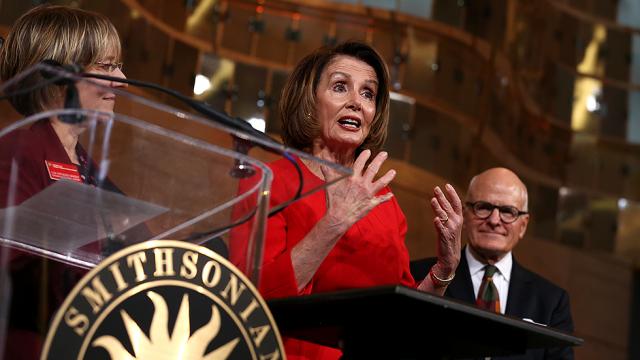
House Minority Leader Nancy Pelosi has warned that Democratic efforts to impeach President Trump will hurt the party’s chances in November’s midterm elections ©Greg Nash
The election of any President is a sacred thing and should only be overturned under severe circumstances of harm to the country. Not embarrassment to the country, not the country’s potential loss of world leadership and certainly not an opposing political party’s feeling of harm to the country. This is why the Constitution mandates a two-thirds supermajority to convict a President being impeached.
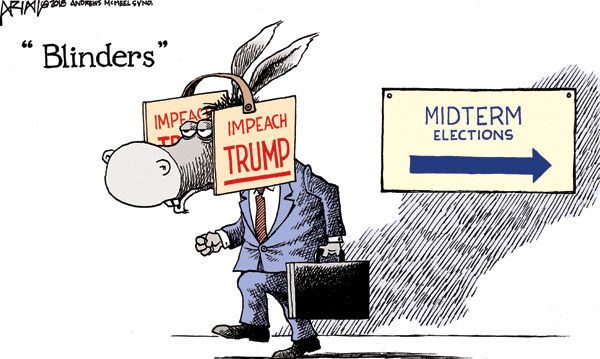
Republicans are hoping that Democrats focusing to much on impeachment will lose them the mid-term elections and prevent the blue wave from happening
It’s understandably painful for Democrats to see President Trump roll back policies that they fought hard to create, it’s hard for Democrats to see the embarrassment that President Trump displays on the world stage, and the fear Democrats have about the direction President Trump is leading the country to is sincere. But none of this rises to the high bar of an impeachment.
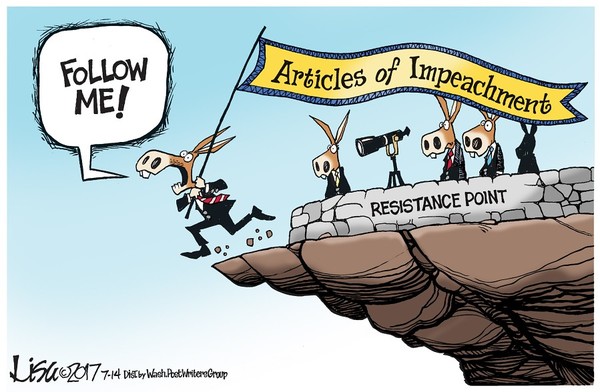
Democrat Leaders Chuck Schumer and Nancy Pelosi have both said that trying to impeach President Trump right now could hurt the Democratic Party
All of the aforementioned Trump behavior are legitimate reasons for Democrats and other like-minded Americans to un-elect President Trump in the 2020 presidential elections. His behavior should remind Democrats that elections do indeed have consequences, sometimes harsh consequences for the losing political party.
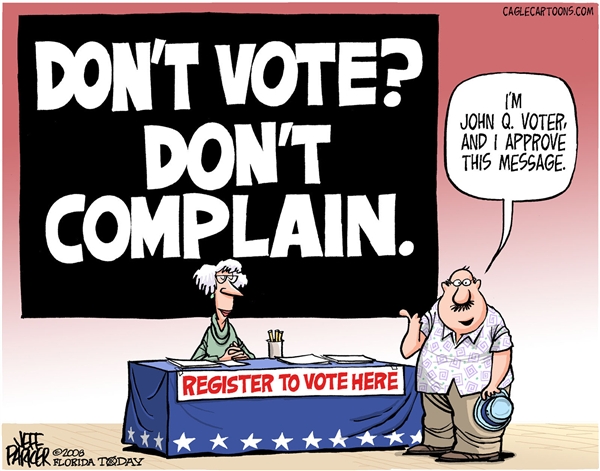
Billionaire Tom Steyer claims that over 2 million people who signed his impeachment petition didn’t vote in 2016
Democrats should shift their focus from Trump impeachment, by turning out as many people as possible to elect a person of their choice in 2020. Tom Steyer claims that of the 5.4 million people who signed his petition to impeach President Trump, 60% of them didn’t vote in 2016. Considering that less than 100,000 votes gave President Trump his margin of victory, Democrats should concentrate on getting that 60% (over 2 million votes) and everybody else they can to the polls to vote to restore the America they know and love.



